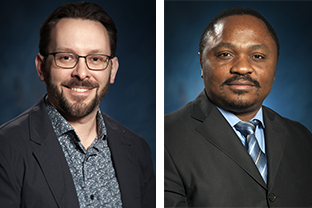January 29, 2020
SVSU Braun Fellowship to support research re-examining century-old math theory, stereotypes in environmentalism
 Each year, two Saginaw Valley State University faculty members are empowered by the SVSU Braun Fellowship to develop their research and support scholarly pursuits that benefit communities across the globe.
Each year, two Saginaw Valley State University faculty members are empowered by the SVSU Braun Fellowship to develop their research and support scholarly pursuits that benefit communities across the globe.This year, Olivier Heubo-Kwegna, professor of mathematics, and Ross Singer, associate professor of communication, received these grants to help further their respective research projects that explore a nearly century-old math theory as well as gender-based stereotypes in environmentalism.
The Braun Fellowship program awards $37,500 over three years in funding for a research project for each recipient; support that includes funding for research tools, expenses, equipment, and travel.
Heubo-Kwegna’s research will attempt to address a solution within an algebraic theory that has eluded his mathematician peers. That theory, known as “multiplicative ideal theory,” began to take shape in 1930 when well-known German mathematicians Wolfgang Krull, Heinz Prüfer and Emmy Noether first began to work on the ideal systems at the core of the theory. Heubo-Kwegna hopes to address one of the mathematical problems within that theory that concerns complex arrangements of mathematical “rings,” which are structures used in abstract algebra. He hopes his work will help bring an end to a decades-old “open problem.”
"In mathematics, an open problem is any challenging problem that can be stated clearly and unambiguously — and that the research community believes there is a clear solution — but after some years, no one has found the solution," Heubo Kwegna said.
He received his Ph.D. in mathematics at New Mexico State University in 2009.
He joined the SVSU faculty later that year and became an assistant professor of mathematics. Throughout the years, he has published over 19 articles and has been an invited speaker at nine conferences.
Singer’s research will examine the relationship between gender and environmentalism. He plans to explore the ways in which grassroots advocates of environmentalism view the role of gender and feminism in the work they perform. He will utilize his earlier research and pursue new interviews with Midwest environmentalists. With the results, he plans to examine how gender-centric stereotypes about environmentalists — particularly the stereotype that leads some to consider environmentalism as a feminine cause — impacts environmentalism. His study will also examine how environmentalists are challenging such stereotypes.
“One of my goals is to identify communication strategies that nonprofit environmental organizations can use to get people of different gender identities to get involved and work together on societal problems,” Singer said.
Singer received his Ph.D. in communication studies at Bowling Green State University in 2008.
Later that year, he became an assistant professor in the Department of Speech Communication at Southern Illinois University Carbondale up until 2012. He joined SVSU the following year and has been featured in peer-reviewed academic journals and edited scholarly chapters 14 times over the last decade.
His research specialty involves public environmental communication strategies and effects; he expects to release a book on the topic this year. Singer also serves as associate editor of Environmental Communication, an international academic journal. Singer’s studies typically explore modern environmentalism’s relationship with other social movements, and how they might best work together.
Both Singer and Heubo-Kwegna plan to present their findings by authoring articles submitted in peer-reviewed academic journals while also presenting the material at scholarly conferences.
Established in 2005, the Braun Fellowship program was created through a $1.5 million endowment from the Saginaw-based Harvey Randall Wickes Foundation. Administered by the Saginaw Community Foundation, the program's purpose is to recognize the exceptional accomplishments and potential of select SVSU faculty and staff. It is named in honor of Ruth and Ted Braun.
